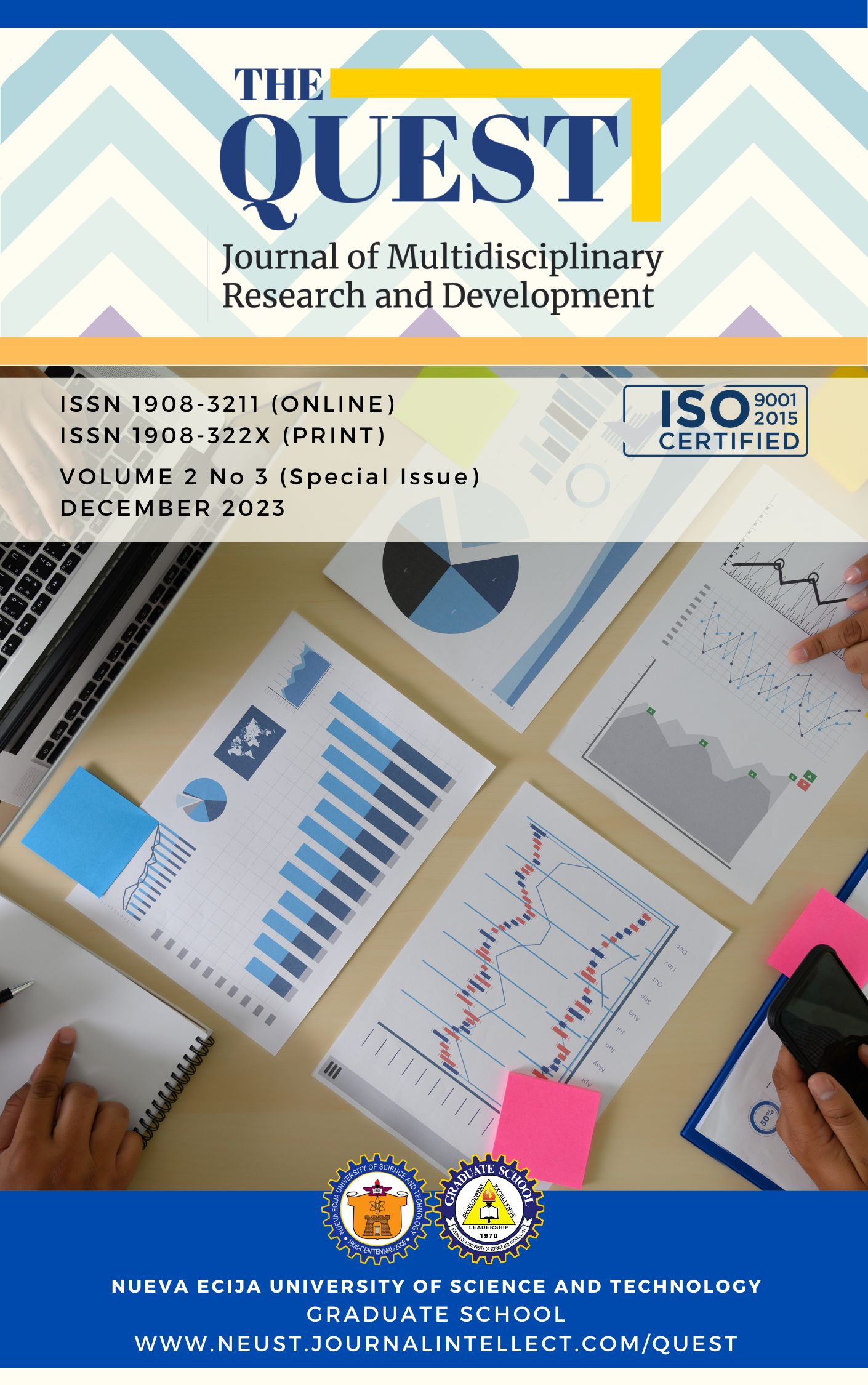Customer Service Through Artificial Intelligence in Anjiela Technology Company: A Comprehensive Study

Published 12/30/2023
Keywords
- Artificial Intelligence,
- Challenges,
- Customer Satisfaction,
- Customer Service,
- Implementation
How to Cite
Copyright (c) 2023 The QUEST: Journal of Multidisciplinary Research and Development

This work is licensed under a Creative Commons Attribution-NonCommercial 4.0 International License.
Abstract
This quantitative descriptive research examined the impact of Artificial Intelligence (AI) on customer service at Anjiela Technology Company in China. Using a sample of 100 customers, data were collected via a structured survey covering AI's influence on customer satisfaction, efficiency, personalization, accuracy, and user-friendliness. The findings highlight AI's positive impact on customer satisfaction, while also identifying areas for improvement, such as reducing wait times and enhancing personalization. Additionally, the study underscores the importance of trust and transparency in AI adoption, addressing customer concerns about data privacy, fairness, and user control. Recommendations include enhancing AI training, addressing technical challenges, improving data quality, ensuring ethical compliance, and enhancing transparency through collaboration among different units within the organization. In conclusion, this research underscores AI's potential for improving customer service and emphasizes the need to address challenges and ethical considerations for effective implementation.
References
- Agreda, A.G. (2020). Ethics of autonomous weapons systems and its applicability to any AI systems. Telecommunications Policy, 44, 101953.
- Al-Araj, R., Haddad, H., Shehadeh, M., Hasan, E.F., & Nawaiseh, M.Y. (2022). The Effect of Artificial Intelligence on Service Quality and Customer Satisfaction in Jordanian Banking Sector. WSEAS TRANSACTIONS ON BUSINESS AND ECONOMICS.
- Bogdanov, A.V., Degtyarev, A.B., Shchegoleva, N.L., & Khvatov, V. (2020). Data Quality in a Decentralized Environment. Computational Science and Its Applications – ICCSA 2020, 12251, 58 - 71.
- Butenko, E. (2018). Artificial intelligence in banks today: Experience and perspectives.
- Butow, P.N., & Hoque, E. (2020). Using artificial intelligence to analyse and teach communication in healthcare. The Breast : official journal of the European Society of Mastology, 50, 49 - 55.
- Castelo, N. (2019). Blurring the Line Between Human and Machine: Marketing Artificial Intelligence.
- Coyle, T.R. (2013). Effects of processing speed on intelligence may be underestimated: Comment on Demetriou et al. (2013). Intelligence, 41, 732-734.
- Dodigovic, M. (2007). Artificial Intelligence and Second Language Learning: An Efficient Approach to Error Remediation. Language Awareness, 16, 113 - 99.
- Fjelland, R. (2020). Why general artificial intelligence will not be realized. Humanities and Social Sciences Communications, 7, 1-9.
- Goltz, N.(., & Dondoli, G. (2019). A note on science, legal research and artificial intelligence. Information & Communications Technology Law, 28, 239 - 251.
- Ho, S., & Tam, K.Y. (2005). An Empirical Examination of the Effects of Web Personalization at Different Stages of Decision Making. International Journal of Human–Computer Interaction, 19, 112 - 95.
- Hongxun, T., Honggang, W., Kun, Z., Mingtai, S., Hao-song, L., Zhong-ping, X., Taifeng, K., Jin, L., & Yaqi, C. (2018). Data quality assessment for on-line monitoring and measuring system of power quality based on big data and data provenance theory. 2018 IEEE 3rd International Conference on Cloud Computing and Big Data Analysis (ICCCBDA), 248-252.
- Khisamova, Z.I., & Begishev, I.R. (2019). Criminal Liability and Artificial Intelligence: Theoretical and Applied Aspects. Russian Journal of Criminology.
- Lallé, S., & Conati, C. (2019). The role of user differences in customization: a case study in personalization for infovis-based content. Proceedings of the 24th International Conference on Intelligent User Interfaces.
- Li, Z., Rau, P.P., & Huang, D. (2020). Who Should Provide Clothing Recommendation Services: Artificial Intelligence or Human Experts? J. Inf. Technol. Res., 13, 113-125.
- McKee, K.R., Bai, X., & Fiske, S.T. (2021). Understanding Human Impressions of Artificial Intelligence.
- Moreau, É.M. (2006). The impact of intelligent decision support systems on intellectual task success: An empirical investigation. Decis. Support Syst., 42, 593-607.
- Prentice, C., & Nguyen, M. (2020). Engaging and retaining customers with AI and employee service. Journal of Retailing and Consumer Services, 56, 102186 - 102186.
- Racine, E., Boehlen, W., & Sample, M. (2019). Healthcare uses of artificial intelligence: Challenges and opportunities for growth. Healthcare Management Forum, 32, 272 - 275.
- Sijing, L., & Lan, W. (2018). Artificial Intelligence Education Ethical Problems and Solutions. 2018 13th International Conference on Computer Science & Education (ICCSE), 1-5.
- Swarte, T.D. (2019). The Need for Ethical Artificial Intelligence and the Question of Embedding Moral and Ethical Principles. Advances in Robotics & Mechanical Engineering.

